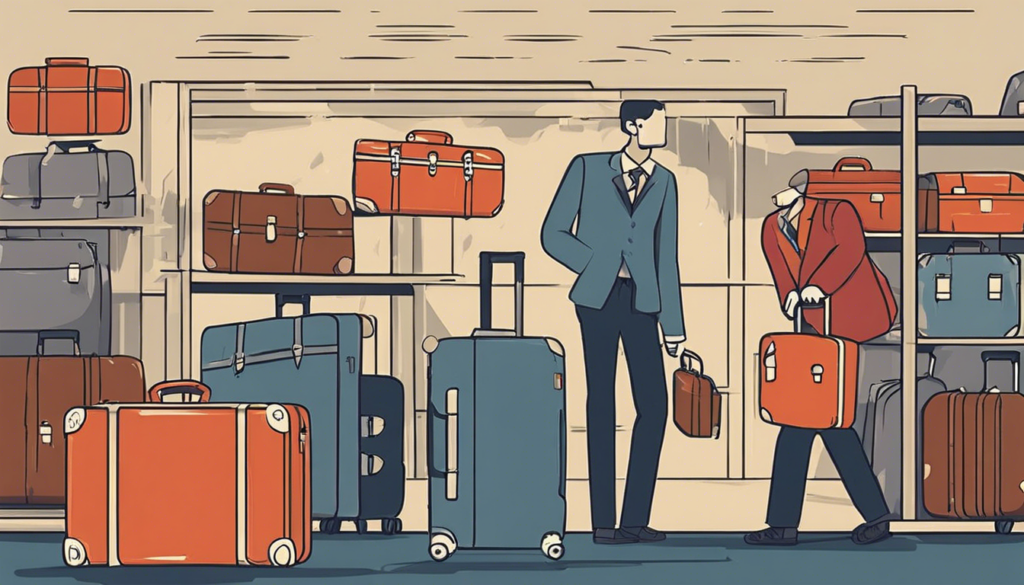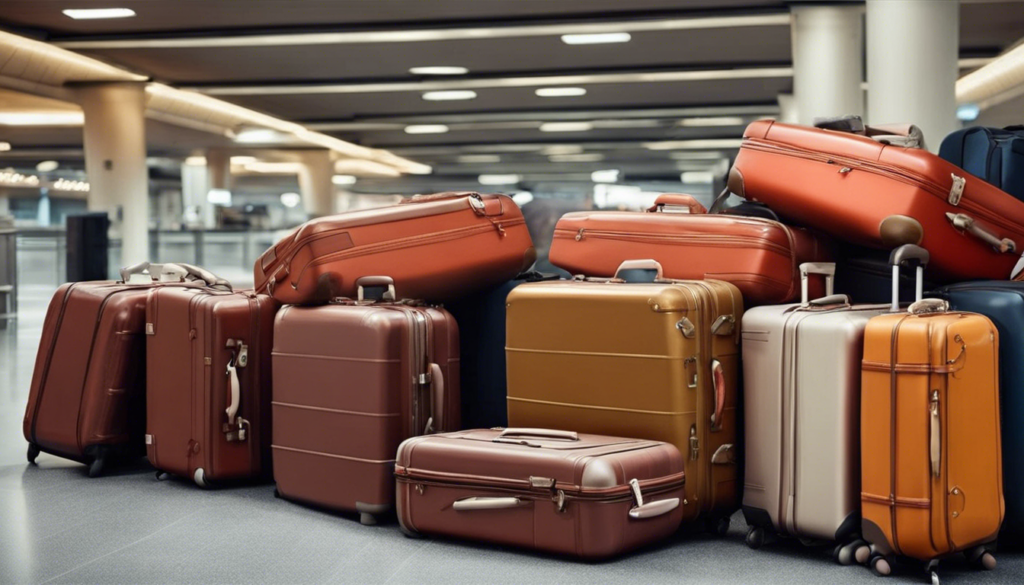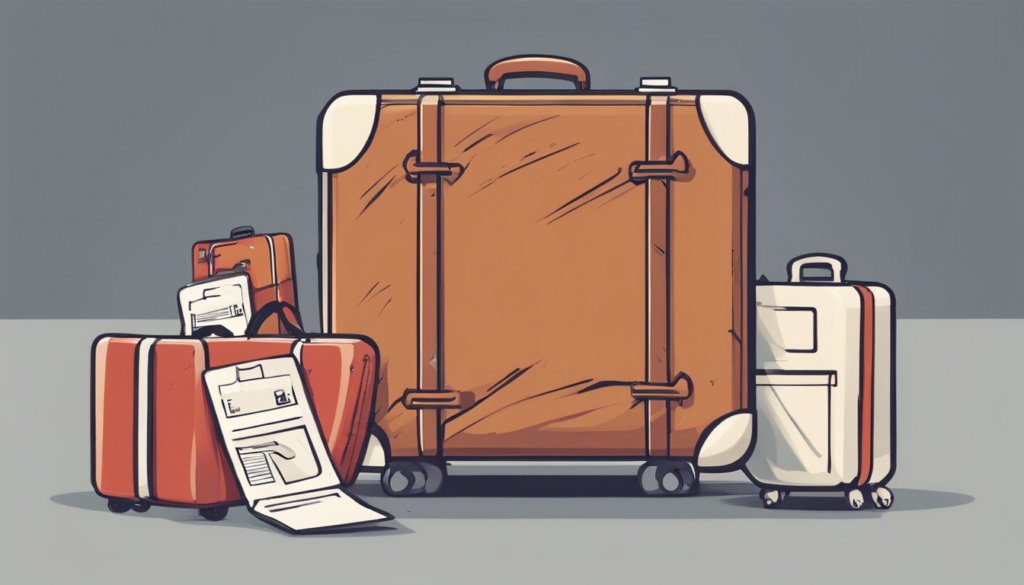Why Baggage Loss Insurance is Essential
Traveling is an exciting and rewarding experience, but it can also come with its fair share of challenges. One of the most common issues travelers face is the risk of losing their luggage during their journey. This can be a frustrating and stressful situation, especially if your belongings are essential to your trip.
Fortunately, baggage insurance offers a practical solution by providing financial compensation and a sense of security in case your bags are lost or misplaced. With this coverage, you can enjoy your travels with greater confidence and less worry.
It is unforeseen disruptions and possible loss of personal items, so ensure your trip remains smooth. Gaining insight into this type of insurance can assist you in deciding if it’s the right choice for your upcoming travels.
Picture this: You’ve arrived at your dream trip spot; however, your baggage hasn’t. It’s an irritating and nerve-racking situation for any traveler. That’s the place where baggage loss insurance turns into invaluable. This coverage offers peace of mind by protecting you from surprising prices and hassles associated with misplaced, stolen, or broken baggage throughout your journey.
Baggage loss insurance is not just about financial reimbursement; it’s also about the convenience and support services that come with it. When your bags go missing, the insurance company can assist with the tracking and recovery process, liaising with airlines and airports on your behalf.
Furthermore, if you’re left without essentials, many policies offer an allowance for emergency purchases, ensuring you can continue your trip with minimal disruption.
In this comprehensive guide, we will cover the elements of luggage loss insurance coverage, including its significance, protection, and how to select the best policy to safeguard your belongings.
What You Learn:
- Understanding the details of luggage loss insurance is essential for every traveler. It provides peace of mind and financial protection, knowing belongings are lost or stolen while away from home.
- In the following sections, we will delve into the types of incidents covered by most policies, the typical compensation you can expect, and the exclusions to watch out for, ensuring you make an informed decision when choosing the right insurance for your needs. What baggage loss insurance covers
- Baggage loss insurance is designed to provide financial protection in the event that your personal belongings are lost, stolen, or damaged during your travels.
- This type of insurance typically covers the contents of your luggage up to a certain monetary limit, which can vary depending on the policy you choose.
- It’s important to carefully review the coverage details, as some policies may offer additional benefits such as reimbursement for emergency purchases of essentials if your baggage is delayed. Differences between private belongings coverage and baggage insurance
- Understanding the nuances between private belongings coverage and baggage insurance is crucial for any traveler. While both types of insurance aim to protect your items during transit, private belongings coverage typically extends to incidents occurring at home and while traveling, offering a broader scope of protection.
- Baggage insurance covers lost, damaged, or stolen items in your luggage while traveling. It’s important for travelers carrying valuable or essential items. Tips for choosing the right coverage for global trips
- When considering the ideal luggage insurance for your global travels, the value of the items you typically carry. Look for policies that offer comprehensive coverage limits that align with the cost of your belongings.
- Moreover, pay attention to the fine print regarding claim processes and what types of incidents are covered, as some policies may have exclusions that could affect your ability to be reimbursed for certain types of losses. Top suppliers like Allianz and AXA
- offer comprehensive travel insurance options that can be tailored to your specific needs. These providers often include benefits such as trip cancellation, emergency medical coverage, and baggage loss or delay.
- It’s crucial to compare the levels of coverage and the premium costs to ensure that you’re getting the best price, the protection that gives you peace of mind while traveling. Tips for submitting an insurance claim for misplaced baggage

When filing a claim for lost luggage, timely action and attention to detail are paramount. Begin by promptly reporting your missing items to the airline and the insurance company.
It’s essential to keep all your travel documents, receipts for any emergency purchases, and a detailed list of the contents of your baggage, as these will be required when submitting your claim. The more organized and thorough you are in the documentation process, the smoother the claim process.
Baggage loss insurance covers personal objects in case your baggage is misplaced, stolen, or broken throughout the journey. Coverage limits and conditions vary between policies, so studying the fine print is important.
Key Features of Baggage Loss Insurance:
- Lost Baggage: Many insurance policies offer protection for delayed baggage. This is especially useful if your bags are delayed upon arrival, leaving you without essential items at your destination.
- Compensation often includes a fixed amount to cover the purchase of necessities such as clothing and toiletries during the interim period before your baggage is delivered. Reimburses you in case your baggage is completely misplaced.
- Stolen Luggage: Travel Insurance Benefits: In addition to coverage for lost or delayed baggage, travel insurance policies often provide benefits for stolen luggage, offering peace of mind for travelers.
- If your possessions are taken, you can file a claim with your insurer to recoup the value of your items, subject to the terms and conditions of your policy.
- This protection is invaluable, especially when visiting areas known for pickpocketing or theft, ensuring that one is not financially disadvantaged by such unfortunate incidents. Covers theft, usually requiring proof of loss or a police report.
- Damaged baggage: Delayed baggage: If your luggage is delayed, travel insurance can provide essential items you may need to purchase until your bags arrive. This can include clothing, toiletries, and other necessities that are crucial while you’re away from home.
- It’s important to check the specific terms of your policy, as there may be a minimum delay time before this coverage kicks in, and limits to the amount you can claim for these interim expenses. Compensates for repairs or replacements if your baggage is damaged.
Pro Tip: Travel insurance policies often include coverage for personal effects, which means if your belongings are stolen or lost during your journey.
However, it’s crucial to report any loss or theft to the local authorities as soon as possible, as most insurance providers will require a police report to process your claim.
Additionally, there may be per-item or category limits on claims, so high-value items like jewelry or electronics might only be covered up to a certain amount, unless you’ve arranged for additional coverage.
Always file a report with the airline or authorities as quickly as you discover your baggage is misplaced or broken. This data is for processing claims.
- What does baggage and private belongings protection encompass?
Baggage and personal belongings coverage typically includes reimbursement for the loss, damage, or theft of your luggage and its contents while traveling. This type of insurance can provide peace of mind, especially when carrying valuable items or if your trip involves multiple destinations where luggage mishandling could occur.
Understanding policy limits is crucial, especially since electronics or jewelry often have coverage caps. It’s important to note that belongings coverage and baggage loss insurance are commonly mistaken but serve different purposes.
- Baggage Loss Insurance: Baggage loss insurance covers lost, stolen, or damaged luggage and belongings during travel.
- It’s crucial to understand the scope of this coverage, as it typically has strict reporting deadlines and may only reimburse you for a portion of your lost items’ value after depreciation is taken into account. Generally focuses on covering checked and carry-on baggage throughout your journey.
- Personal Belongings Coverage: Travel Insurance Add-Ons: To enhance your coverage for personal belongings, many travel insurance policies offer add-on options that can provide higher compensation limits and cover a broader range of incidents.
- These add-ons are especially valuable for travelers with expensive electronics, jewelry, or other high-value belongings.
- By opting for additional protection, you can travel with greater peace of mind, knowing that your most prized possessions are safeguarded against potential travel mishaps. This might extend past your journey, covering objects throughout resort stays or excursions.
However, it’s not just about securing material possessions; AI personalization in travel insurance extends to tailoring coverage to individual lifestyle and travel habits. For instance, frequent flyers may benefit from policies that offer flexible cancellation options or include automatic adjustments for changes in travel advisories.
Similarly, adventure seekers can have their policies customized to cover extreme sports or off-the-beaten-path explorations, ensuring that their unique brand of thrill-seeking is accounted for without the need for cumbersome add-ons.
This method improves the user experience by allowing travelers to pay only for the coverage they need. Travelers with high-value items like jewelry or electronics should consider adding extra coverage since standard plans often offer limited protection.
- How does travel insurance cover private belongings?
Travel insurance usually covers lost, stolen, or damaged items during your trip. To file a claim, you typically need proof of ownership and a police report for theft.
It’s important to read the fine print, as there may be limits on the value of items covered and exclusions for certain types of belongings. Always check the specifics of your policy to understand the extent of protection for your private items while on the move.
Travel insurance policies usually include baggage loss insurance coverage together with broader protection. But there are many particulars to remember:
Typical protection limits:
- Per-Item Limit: Most travel insurance policies impose a per-item limit, which caps the amount you can claim for a single item. This is particularly important with high-value items such as expensive cameras, jewelry, or electronics.
- It’s essential to review these limits before you travel to ensure that your most valuable possessions are adequately covered, or to consider purchasing additional coverage for items that exceed the standard per-item limit. Many policies cap how much you can claim for a single item (e.g., $500 for electronics).
- If you’re frequent travelers carrying valuable items like high-end cameras, laptops, or jewelry, it’s worth considering a personal articles policy or adding a ‘floater’ to your insurance. This specialized coverage offers enhanced protection for valuables that surpass standard policy limits.
- Keeping a current list of your belongings, receipts, or appraisals, makes filing claims easier if your items are lost or stolen during travel. Most policies limit claims for lost or damaged items to $2,000–$3,000.
- Deductibles: When considering the financial implications of your travel insurance, it’s crucial to understand the role of deductibles. This is the amount you’ll be responsible for paying out of pocket before your insurance coverage kicks in.
- Typically, the higher the deductible you choose, the lower your premium will be; however, this also means you’ll bear a greater portion of the financial burden should you need to file a claim.
- It’s important to strike a balance that suits your budget and risk tolerance when selecting a deductible for your travel insurance policy. A deductible is the amount you pay out of pocket before your protection begins in insurance policies.
Case Study: AI personalization in travel insurance allows insurers to analyze large data sets and customize deductibles and coverage based on individual risk profiles.
This improves the customer experience by offering policies tailored to their needs and travel habits while streamlining the insurer’s risk assessment.
Travelers enjoy a smoother, more tailored insurance experience, while insurers see happier customers and fewer claims. Jane carries her suitcase as she returns home from a work trip.
Her insurance coverage covered $1,500 of her misplaced objects; however, her $1,200 laptop computer, valued at $500 due to the electronics cap, was not covered.

- Choosing the Right Policy for International Travel
Understanding insurance policies can feel overwhelming, especially for international travel where risks are greater and more diverse.
It’s crucial for travelers like Jane to thoroughly understand the fine print and limitations of their coverage before embarking on their journey. By doing so, they can avoid the unpleasant surprise of underinsurance and ensure that valuable items are adequately protected against theft, loss, or damage.
International travel added dangers, corresponding to language limitations and unfamiliar legal programs. That’s why a baggage loss insurance policy for worldwide journeys.
Key Considerations:
- High coverage limits: When selecting a baggage loss insurance policy for international travel, it’s essential to consider policies with high coverage limits. This ensures that you can recoup the full value of your belongings, should they be lost or stolen.
- Look for policies that cover various personal items, like electronics and jewelry, to ensure high-value goods are protected.
- It’s also prudent to check the claims process for each policy – a straightforward, user-friendly claims procedure can significantly reduce the stress of dealing with lost possessions while abroad. Your coverage gives sufficient protection, particularly for high-value objects.
- 24/7 Assistance: When considering AI personalization in the context of travel insurance, it’s important to note how this technology enhances customer experience. AI-driven platforms can tailor assistance services to individual needs, ensuring travelers receive personalized support anytime, anywhere.
- This could range from real-time travel updates to immediate help in an emergency, demonstrating the insurance provider’s commitment to their clients’ well-being throughout their journey. Look for insurance policies that provide 24/7 emergency assistance to help you file claims overseas.
- Global Provider Network: Access to a comprehensive global provider network is a crucial feature of any travel insurance policy. It ensures that wherever you are in the world, you can find a hospital, clinic, or medical professional within the insurance company’s network, facilitating prompt and high-quality care.
- This network not only simplifies the process of locating approved healthcare services but also streamlines the claims process, allowing for more efficient handling of medical expenses and reimbursements. Choosing a supplier with a global community ensures you can easily assist.
Top International Providers:
- Allianz Travel Insurance: Allianz Travel Insurance is renowned for its comprehensive coverage and exceptional customer service, which is available 24/7 to assist with any travel-related concerns or emergencies.
- Their policies are customizable, with options ranging from basic travel insurance to full coverage that includes trip cancellation, emergency medical expenses, and even repatriation.
- With a vast network of hospitals and medical providers around the world, Allianz ensures that policyholders receive the best possible care, no matter where their travels take them. Known for comprehensive global coverage.
- Moreover, Allianz’s commitment to customer satisfaction extends beyond just coverage. They offer personalized assistance services that can make all the difference during a stressful situation.
- Whether you need help with lost documents, legal advice, or emergency message relay, Allianz’s multilingual support team is available 24/7 to provide guidance and support tailored to your unique needs.
- This level of personalized attention ensures that travelers can explore the world with confidence, knowing they have a reliable partner in Allianz. AXA Travel Insurance offers excessive coverage limits and excellent customer support for international travelers.
- Does travel insurance cover baggage for particular occasions?
Certainly, when it comes to safeguarding your belongings for those special events – whether it’s a destination wedding or an international conference – travel insurance can be a lifesaver.
Many travel insurance policies include coverage for lost, stolen, or damaged baggage, providing peace of mind for travelers carrying valuable or essential items.
It’s important to review the specifics of your policy, as coverage limits and item eligibility can vary, ensuring that your most prized possessions are protected as you journey to your special occasion.
Baggage loss insurance generally covers items lost or damaged in transit; however, many insurance policies extend to different conditions, like theft from a resort room or loss throughout a cruise.
Common conditions lined:
- Lost checked baggage: Delayed luggage compensation: If your bags are delayed for a certain period, typically 12 to 24 hours, your insurance may cover the cost of essential items you need to purchase in the meantime. This can include clothing, toiletries, and other personal effects that allow you to continue your trip with minimal disruption.
- It’s important to keep all receipts for any purchases made due to delayed baggage, as these will be required when submitting a claim to your insurance provider. Items misplaced by airlines or transport suppliers.
- Theft from Hotel or Airbnb: Understanding the nuances of your travel insurance policy is crucial when dealing with theft from your hotel or Airbnb. Most policies will cover the loss of personal items due to theft, but it’s essential to report the incident to the local police and your accommodation provider as soon as possible.
- Make sure to obtain a police report and any evidence of the break-in, as these documents will be vital when filing a claim with your insurance company to prove the theft occurred and to detail the extent of your losses. Reimbursement for stolen private objects.
- Loss During a Cruise: If you experience theft while on a cruise, it’s crucial to report the incident to the ship’s security office immediately. They will conduct an investigation and provide you with a report, which you will need for your insurance claim.
- Additionally, most cruise lines have policies in place to assist guests who have been victims of theft, so be sure to inquire about any support they can offer, including potential reimbursement or compensation for your lost items. Protection for baggage misplaced at sea or throughout shore excursions.
The claims process could be nerve-racking if you’re not ready. Follow the following tips to get the most out of your baggage loss insurance:
Steps for Maximizing Your Claim:
- File a Report Right Away: Document Everything: As soon as you notice your baggage is missing, document every detail. Take photographs or videos of the claim area and keep all travel documents, such as boarding passes and baggage claim tickets, as they will be crucial when filing your claim.
- Make a list of the contents of your lost baggage, ideally with receipts or bank statements to prove their value. This will help to substantiate your claim and ensure that you are adequately compensated for your loss. Report misplaced or stolen baggage to the airline or resort. Get a written affirmation.
- Keep Receipts and Document Items: If you are unable to recover your lost items, the documentation you have gathered will be crucial when filing a claim with your travel insurance company. Ensure that you file your claim promptly, as most insurance policies have specific time limits for reporting losses.
- Moreover, being thorough and organized with your documentation can expedite the claims process, making it more likely for you to receive fair compensation without unnecessary delay. Keep receipts and take images of your objects earlier than your journey.
- Proof of Ownership: Valuation of Items: It’s essential to have an accurate assessment of the value of your belongings, especially for items that are particularly valuable or unique. Appraisals or valuations should be obtained before your trip and updated regularly to reflect current market values.
- This will ensure that in the event of a loss, the insurance coverage reflects the true worth of your possessions, allowing for a reimbursement that aligns with the actual loss experienced. Insurance companies typically require proof of ownership or receipts, especially for valuable items.
- Mind the Deadlines: Understanding your policy’s timelines is crucial. Most insurance policies have strict deadlines for when claims must be filed following an incident.
- It’s important to familiarize yourself with these time constraints to ensure that you submit all necessary documentation on time, thus avoiding the risk of a claim denial due to a missed deadline.
- Proactive management of your claim can facilitate a smoother process and a faster resolution. Most insurers have strict deadlines for filing claims, often inside 7 to 10 days.
Quick Tip: To ensure you stay within these crucial timeframes, it’s advisable to set up reminders or use calendar alerts. Keeping a detailed record of all communications with your insurer, including dates and summaries of conversations, can also be invaluable.
This meticulous approach not only helps in tracking the progress of your claim but also provides a clear audit trail in the event of any disputes. By staying organized and attentive, you can navigate the claims process with greater confidence and efficiency.
Some bank cards provide secondary baggage insurance coverage. Check your card’s benefits before purchasing a separate policy.
- Comparing Baggage Insurance Providers
When comparing baggage insurance providers, it’s essential to review their coverage options, premium costs, and the claims process. Look for providers that offer comprehensive protection against loss, damage, theft, and delays, ensuring that you’re covered in a variety of travel scenarios.
Additionally, consider the ease of filing a claim and the reputation of the insurer for handling claims promptly and fairly. Reading customer reviews and seeking recommendations can provide valuable insights into the experiences of other travelers with these providers.
When evaluating baggage insurance coverage suppliers, it’s important to consider factors like coverage limits, ease of the claims process, and buyer satisfaction.
| Provider | Coverage Limit | Key Features | Customer Rating |
|---|---|---|---|
| Allianz | Up to $2,000 | High item restrictions | 4.5/5 |
| AXA | Up to $3,000 | High per-item restrictions | 4.7/5 |
| World Nomads | Up to $2,500 | Adventure sports activities protection | 4.4/5 |

Interactive Elements and Additional Resources
When considering AI personalization in the realm of travel insurance, it’s essential to recognize how these companies leverage artificial intelligence to enhance customer experiences. Allianz, AXA, and World Nomads are at the forefront of utilizing AI to tailor coverage options and claims processing to individual traveler needs.
This technology not only streamlines the application process but also provides real-time support and personalized recommendations, ensuring that adventurers and globetrotters have peace of mind tailored specifically to their unique itineraries and risk profiles. To allow you to stay knowledgeable and protected, we’ve included useful instruments and downloadable assets:
Downloadable Checklist:
- What to do earlier than your journey
- Steps to take after your baggage is misplaced
- Essential documents to keep for insurance claims
Quiz: Is your baggage properly insured?
Take our transient quiz to decide if you probably have enough protection on your upcoming journey.
- Frequently Asked Questions (FAQ)
Q: What is personal baggage in insurance?
A: Personal baggage consists of private belongings, corresponding to clothes, electronics, and toiletries, that you carry throughout the journey.
Q: Does journey insurance coverage cover stolen objects?
A: Most travel insurance policies cover stolen objects and offer you to file a police report and observe the course of action.
Q: How do I select the perfect journey insurance coverage for baggage?
A: Look for policies with high coverage limits and strong customer reviews. Allianz and AXA are trusted choices for frequent vacationers.
Conclusion: Protect Your Belongings and Travel With Peace of Mind
Losing your luggage can ruin a trip, but baggage loss insurance offers peace of mind. With comprehensive coverage for lost, stolen, or damaged belongings, you can avoid the financial and emotional strain of travel mishaps. Whether it’s an international adventure or a special occasion like a cruise, this coverage can be a game-changer.
Call to Action: Don’t wait till it’s too late—evaluate prime baggage loss insurance coverage suppliers like Allianz and AXA in the present day and secure your private belongings on your subsequent journey.
No matter where you travel, following this information ensures your baggage safety.

